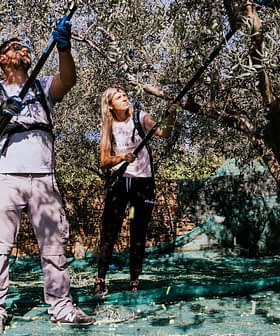 Elena Víboras, Minister of Agriculture, Fisheries and Rural Development, with Spain’s Minister of Agriculture, Food and Environment, Miguel Arias Cañete
Elena Víboras, Minister of Agriculture, Fisheries and Rural Development, with Spain’s Minister of Agriculture, Food and Environment, Miguel Arias Cañete
A proposed new quality seal will help protect Spanish olive oil from “smear campaigns” by new producer countries, according to one of its main proponents, the regional government of Andalusia.
Elena Víboras, Minister of Agriculture, Fisheries and Rural Development in Andalusia, said that agreement was made to start work on the seal during a meeting she attended in Madrid on Tuesday with Spain’s Minister of Agriculture, Food and Environment, Miguel Arias Cañete.
In a press release issued after the meeting, she said it would bolster the image of Spanish and Andalusian olive oil in international markets, facilitating exports.
“We are the world’s leading producers and we need a distinctive mark that certifies the quality of products intended for export,” she said.
She considered the measure “essential” amid what are seen as smear campaigns in new producer countries through the release of reports questioning the quality of Spanish olive oil with statements far from reality.
The truth was that the olive oil sector in Andalusia had made “a big effort to improve in the cultivation, extraction, packaging and storage of virgin olive oils,” Víboras said.
She said her ministry would work with relevant organizations to ensure that the planned quality seal had the broadest possible consensus and achieved the goal of guaranteeing the excellence of the olive oil bearing it.
Víboras did not name the countries she referred to as conducting smear campaigns, nor say which reports had questioned the quality of Spanish olive oil.
One of the most recent reports by a New World producer was that last month by the United States International Trade Commission (USITC) on competition in the global olive oil trade.
Among the main findings in the USITC report were that current international standards allow a wide range of olive oils to be marketed as extra virgin, that the standards are widely unenforced, and that this leads to adulterated and mislabeled products that weaken the competitiveness of U.S.-produced olive oil in the U.S. market.
Spain is the world’s biggest and lowest cost producer of olive oil and the vast majority — 60 percent — of its olive plantations are in Andalusia.








